QMU Transport Strategy 2021-2026 Action Plan
Forward
I am proud of the commitment to encourage Active and Sustainable Travel to our campus at Queen Margaret University. This is vital to us, as it brings benefits to everyone at QMU. From our health and wellbeing, to creating a greener, safer, and more pleasant atmosphere on campus. Our aim is to be a leader in sustainability, recognising our social responsibility to cut carbon emissions, as well as prioritising the health and mental wellbeing of our staff and students.
At the University, we are already working on several projects, such as our affordable bike hire scheme and free local use of Prentice buses for all students. Throughout the year we also have several events such as free bike maintenance, ‘Bike Breakfasts’ and travel advice stalls. Excluding the abnormal 2020/2021 data due to the Covid-19 pandemic, these initiatives have seen a 15% rise in Active Travel to the campus since 2008. We are now hoping to boost this even further, supported by the Travel and Transport Strategy.
This strategy aims to build on the hard work already being done on campus, and to better understand the staff and student needs. Detailed throughout the Strategy are a range of infrastructure and behavioural change projects which will contribute towards achieving this goal. In addition to suggesting opportunities for new infrastructure, it will help to support and link to those currently and/or recently implemented. Furthermore, the strategy presents a framework and sets a direction for partnership working across the University and surrounds. The current economic climate increases the need to ensure multiple benefits are realised and that projects deliver value for money. The development of this Active Travel Strategy was informed by engagement with stakeholders and communities on campus, as well as external experts in the field.

Sir Paul Grice
Principal
1.0 Overview
Queen Margaret University (QMU) has developed with sustainability at its core, from building design, to course content. With transport accounting for the largest share of emissions in Scotland, sustainable methods of commuting are high on the university’s agenda. From a dedicated Active Travel internship, to car share schemes and hire bikes, the university has worked hard to empower and enable staff and students to make sustainable choices.
This Travel and Transport Strategy has been designed to help direct policy, infrastructure and schemes that support the shift to sustainable travel. Through in-depth consultation with stakeholders within the university and the Active Travel community, the strategy has been able to create a 5-year action plan, reflective of the current situation and the future needs and wants of the campus community.
Thanks to funding from the Paths for All “Smarter Choices Smarter Places Open Fund” the following Strategy and associated engagement events were able to come to fruition.
The strategy continues in the following order:
Chapter 2 – Objectives
Chapter 3 – Policy
Chapter 4 – Baseline Data
Chapter 5 – Engagement
Chapter 6 – Key Findings
Chapter 7 – Action Plan
Chapter 8 – Monitoring and Evaluation
Chapter 9 – Summary and Conclusions
2.0 Objective
2.1 Context
QMU has put sustainability at its core, with transport being a key focus. For the last 15 years, a transport planner has been employed on campus for one day a week to focus on travel and transport, ensuring the smooth operation and putting in place policy and incentives to support staff and students to travel sustainably. As a result, there is already multiple ongoing successful projects.
The Travel and Transport Strategy has been developed to take the work to the next level by gaining a deeper understanding of the priorities for staff and students on campus and setting out a clear plan for the University to take forward in coming years.
By this strategy, it will help to guide plans, to make the most efficient use of resources and capital spending, as well as supporting funding applications to carry out future works and deliver behavioural change schemes on campus.
2.2 Forming objectives
In order to ensure the QMU population was widely represented, as well as the strategy team deciding objectives, key stakeholders involved within the project were also asked what objectives they would like to see. By involving stakeholders in the objective formation, it ensured buy-in and that community priorities were met.
2.3 The objectives
As a result of key stakeholder meetings and survey results, the following objectives were considered to be the priority:
OB1: An increased awareness of active and sustainable travel facilities and services on campus;
OB2: Active and Sustainable Travel to be accessible for all;
OB3: An improved cycling culture on campus;
OB4: A more attractive and joined up public transport service; and
OB5: An increased modal share in active and sustainable travel.
3.0 Policy Review
3.1 Campus Policy
3.1.1 Green Travel Plan
QMU produces an annual Green Travel Plan. This plan outlines the role of travel choice in the University’s commitment to sustainability and provides a working framework for the operational requirements of behavior change in the context of our institutional strategic objectives of working towards a carbon neutral institution. As such, it is regularly updated to reflect the evolution of a green travel culture, and the improvements which support it.
This plan intends to give staff and students help in identifying travel choices, journey times and comparative costs for travel to Queen Margaret University.
3.1.2 Green Travel Plan Strategy
The Green Travel Plan Strategy was developed in 2016, with this Strategy superseding it. The Strategy sets out the aim to reduce single occupancy vehicle usage by increasing the following, in relation to sustainable and active travel:
- Availability
- Connectivity
- Fare integration
- Capacity
This Strategy will follow the same basic principles of the Green Travel Strategy, however, will go into further detail on specific actions and be based on extensive consultation.
3.1.3 Climate Change Action Plan 2017 - 2022
Developed in 2017 and currently under review, The Climate Change Action Plan outlines the universities aspirations in order to reduce the universities negative impact on the climate. The University is leading the way in sustainability, achieving a BREAMM rating of excellent, however the university understands that further action is required. The current plan aims to see a 12% reduction by 2022 in carbon emissions, from the 2015 baseline. The 7 key areas for activity are:
- Energy consumption;
- Waste and recycling;
- Water consumption;
- Travel and transport;
- Engagement & education;
- Procurement; and
The revised Climate Change Action Plan for 2022-2027 will aim to set ambitious targets to further reduce emissions throughout the campus and to broaden reporting to include Scope 3 emissions relating to commuting and term time relocation travel.
3.2 Local Policy
3.2.1 East Lothian Local Transport Strategy 2018-2024
The local transport strategies most recent iteration highlights the 4 key issues relating to transport in the area. They are:
- Cycling and Walking Issues.
- Public Transport Issues.
- Land Use Integration Issues; and
- Roads and Parking Issues.
The strategies overall aim is to create a well-connected community with increased use of sustainable transport modes to access services and amenities. This will be achieved through a series of distinct action plans, ranging from tackling road safety to improving cycling provisions.
3.2.2 Local Active Travel Improvement Plan 2018-2024
The Plans overall aim is to make Active Travel the first travel choice for all those that have to make a journey. The achieving of this aim will result in:
- Improved Health and Wellbeing.
- Reduce carbon emissions.
- Improve air quality.
- Reduce congestion.
- Improve Access to amenities, education and employment; and
- Create better places for people.
Key projects to enable to the success of the plan include creating Active Travel Hubs along transport corridors and creating a connected network of high quality walking and cycling infrastructure, linking residential areas and amenities. The Plan makes specific mention to the successful bike hire scheme already in operation at QMU.
4 Campus Facilities
4.1 Existing Facilities
QMU has been working to create a welcoming environment for those walking, wheeling and cycling or using public transport since the campus opened in 2007. There are already a broad range of facilities available to staff, students and the public, shown in Figure and Table 4.1.
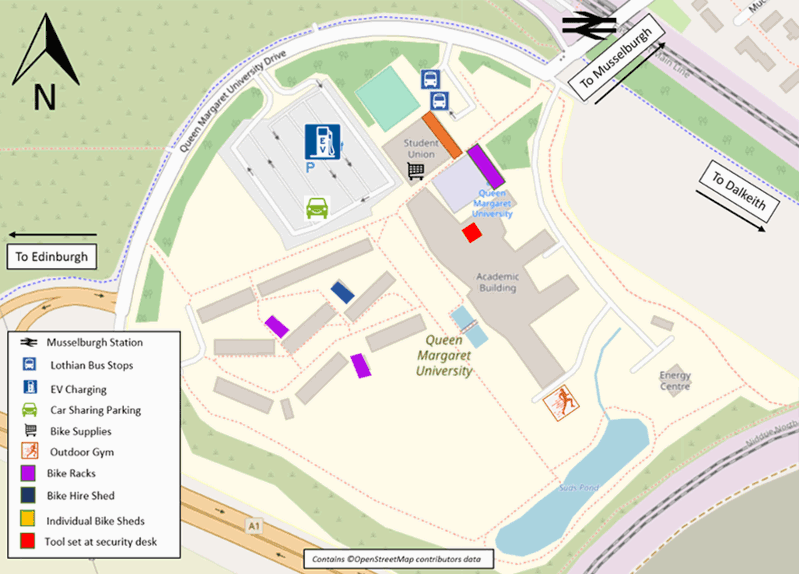
Figure 4.1: Campus Facilities
| Facility | Description |
|---|---|
| Changing Rooms | Changing rooms available with showers in main building and in sports centre |
| Just Eat Cycles | Hire Station available on campus with non-assist and e-bikes available |
| Go E-Bikes | East Lothian Council managed bike hire scheme located at Musselburgh Train Station |
| Active Travel Lockers | Lockers, free of charge, within the main building for those travelling actively |
| Bike Racks | 50 bike racks located in main university square, sheltered and unsheltered |
| Bike Sheds | 50 bike racks located in main university square, sheltered and unsheltered |
| EV Charge Points | Charge Place Scotland charging available in the car park and for campus grounds vehicles. |
| Liftshare Parking Spaces | Designated parking spaces for those sharing a car journey |
| Step-free Access | Campus and university buildings all provide step-free access |
| Train Station | Musselburgh Train Station is less than a 5minute walk from campus |
|
On Campus Bus Stop |
Lothian bus services come right to campus |
| Amazon Lockers | Outdoor lockers to store deliveries |
| Outdoor Gym | Outdoor gym equipment on site |
| Bike Spares | Spare bike inner tubes for sale in Maggies |
| Bike Tool Kit | Free to borrow tool kit for bike repairs. Stored at security desk |
| NCR1 Route | Access to NCR1 is just across the road from campus |
Table 4.1: Existing Campus Facilities
Active Travel to campus is encouraged through the promotion of the existing NCR1 that runs between the Meadows in Edinburgh and the QMU Campus, Figure 4.2, as well as the newly completed Active Travel route running south-east from campus to the River Esk and the existing NCR76, Figure 4.3. Musselburgh Active Toun started public consultation in 2021 in relation to a series of new walking and cycling routes in the area. The proposed Route 5 would run from Musselburgh High Street to campus. The transport team have been actively promoting the consultation to staff and students.
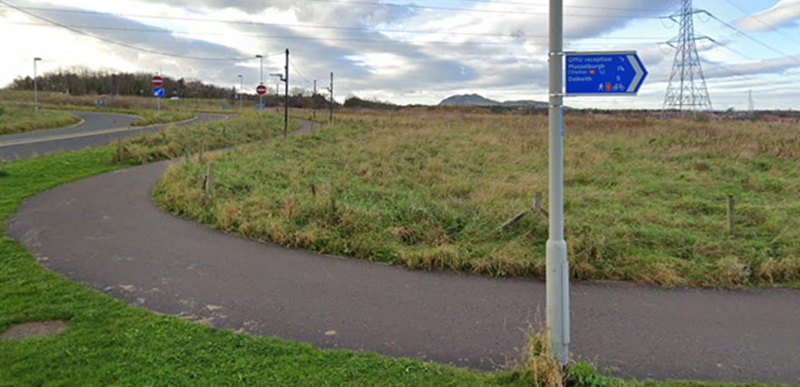
Figure 4.2: NCR1 next to QMU campus
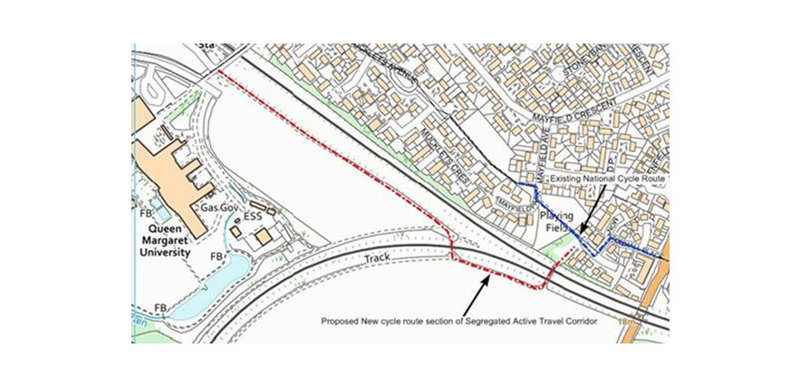
Figure 4.3: New section of Cycle Route (shown in red) to replace existing (shown in Blue).
Cycle Connections is an estates and facilities led scheme on campus that promotes Active Travel through social media and materials on campus as well as running events, training, and offering bike hire to staff and students.
The universities parking permits and car park facilities aim to provide options to promote car sharing and more sustainable transport options as opposed to single occupancy, short car journeys. There are currently 2 free to use EV charging points, Figure 4.4, as well as an enterprise car club vehicle and designated car sharing spaces and associated permit discounts.
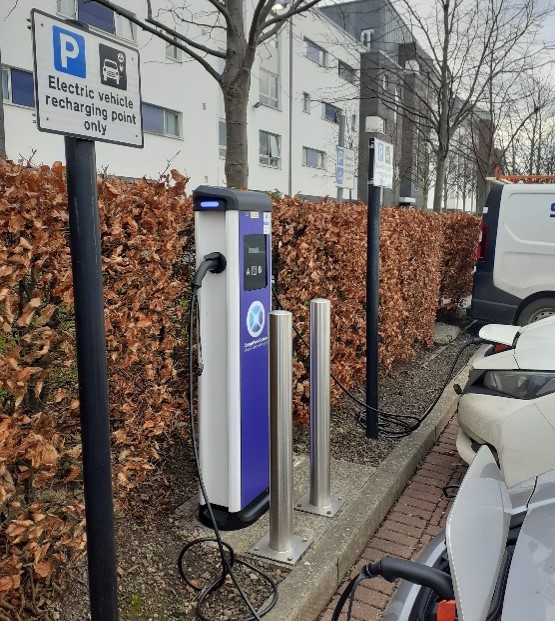
Figure 4.4: Campus EV Charging
Table 4.2 Shows the funding that has been applied for and secured since 2019, alongside it’s use and provider.
| Funding Provider | Value | Date | Use |
|---|---|---|---|
| Paths for All | Part Funded | 2019-2020 | To promote active travel on campus |
| Cycling Scotland | Part Funded | 2020-2021 | To promoter Active Travel on Campus |
| Paths for All | £4789 | 2019 | Dr Bike and Active Travel Strategy |
| Cycling Scotland | £8000 | 2019 | 20 Whyte Hybrid Bikes |
| Energy Saving Trust | £5000 | 2020 | 4 E-bikes |
| Sustrans Artroots Fund |
£3000(paused due to Covid-19 Pandemic) |
2020 | Community Bench Project |
| Big Lottery Fund |
£100 |
2020 | Wellness Walks Equipment |
| Paths for All |
£800 |
2020 | Orienteering Equipment, short film and Promotional Material |
| Cycling Scotland |
£2000 |
2021 | Promotional Materials and security equipment |
| Cycling Scotland |
£5595 |
2021 | 10 Hybrid Bikes and equipment |
| Cycling Scotland |
£350 |
2021 | Adapted Bike Rack |
Table 4.2: Funding from 2019-2021
5.0 Campus Services
5.1 Existing Services
Table 5.1 highlights the key services running on campus that promote sustainable modes of travel for staff and students. The majority of services are run and monitored by the Cycle Connections scheme.
| Service | Description |
|---|---|
| Abandoned Bike Donations | Abandoned bikes on campus are donated to Bike Station or Bikes for Refugees |
| Bike Breakfast | Free Breakfast for walkers, wheelers or cyclists semesterly |
| Bike Hire | £40 bike hire for students and £15/month e-bike trial for staff and students |
| Bike Lock Swaps | Free D-locks for staff and students at semesterly British Transport Police events on campus |
| Cycle Ride Leader Training | Funded training through Cycle Scotland, in conjunction with Napier University |
| Cycle Skills Sessions | Free 1hour sessions with staff or students, on campus, to increase confidence on bike |
| Dr Bike | Funded bike checks for staff, students and community. Held last Thursday of the month |
| Inner Tube Recycling |
Collection of damaged inner tubes which are sent to Cycle of Good to upcycle into accessories. |
| Led Rides |
Free led rides for students to increase awareness of traffic free routes |
| Orienteering |
Monthly events, supported by ELC, to offer walking and running orienteering sessions for staff, students and community. |
| Wellness Walks |
Free series of walks for students on campus to increase wellbeing and create connections |
Table 5.1: Campus Services
The university has also hosted 3 internship programmes, funded by Cycling Scotland and Paths for All. The University recently received confirmation of funding for the continuation of the internship for another year academic year. The funding provides a 34-week full time placement for a recent graduate, where they can learn about transport planning, access funding and run events with the aim of increasing rates of Active Travel on Campus.
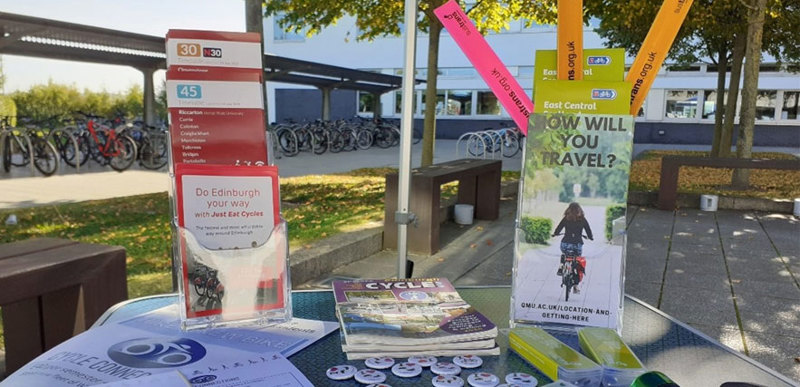
Figure 5.1: Example exhibition stand with bike racks in the background
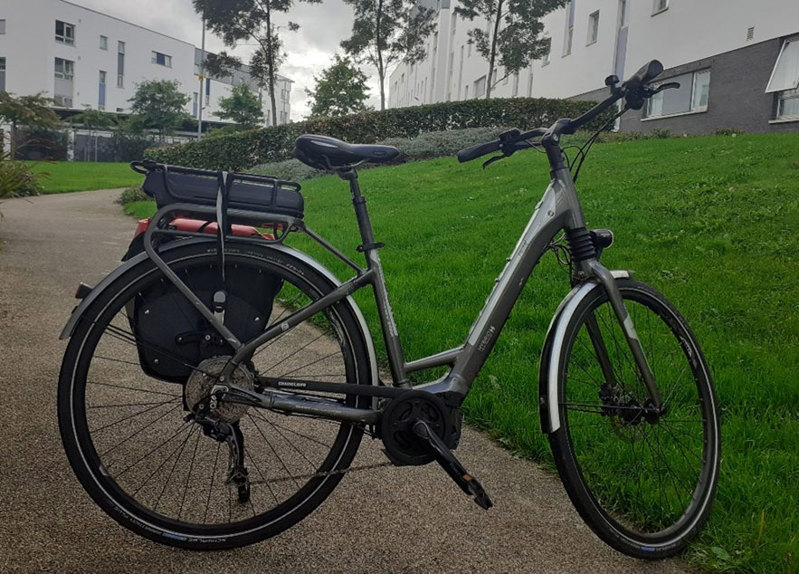
Figure 5.2: An Energy Saving Trust funded E-bike
6.0 Baseline Data
6.1 Overview
To understand the current travel behaviour, information was sourced from the annual travel survey, campus bike counts, student services and key stakeholder meetings.
6.2 Campus Statistics
Queen Margaret University had a total of 8,665 students in the 2019/2020 academic year and can host up to 800 students in the on-campus halls of residence. The campus has 36 Bike racks which are sheltered and 18 unsheltered in University Square by the main building, there are further 80 cycle spaces within the secure bike sheds adjacent to the accommodation buildings.
6.3 Annual Travel Survey
The sustainable transport team hold annual travel surveys to monitor commuting modal share, gather data for Scope 3 emissions reporting and to seek feedback on facilities.
Figure 6.1 shows the mode share between 2018 and 2020, prior to the Covid-19 Pandemic. Although there is an increase in car use, active modes have also increased.
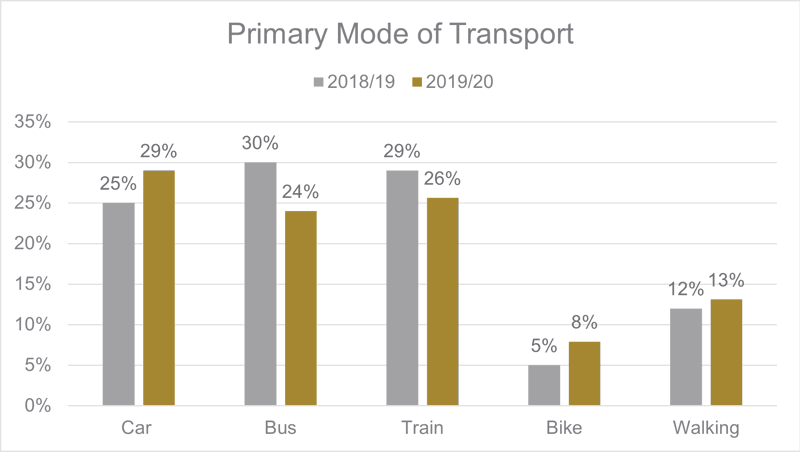
Figure 6.1: Commuting Mode Share
Prior to the covid-19 pandemic there was a concentration of staff and students arriving on campus between 8am and 9am and a more staggered leaving, the majority leaving campus before 5.30pm, Figure 6.2 and 6.3.
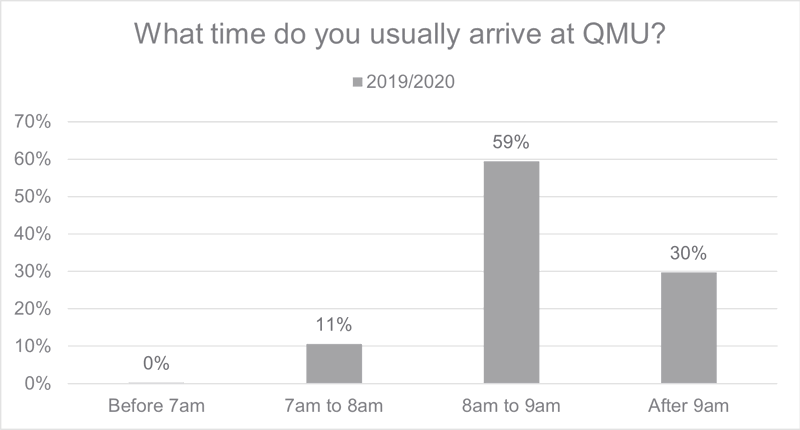
Figure 6.2: Campus Arrival Times
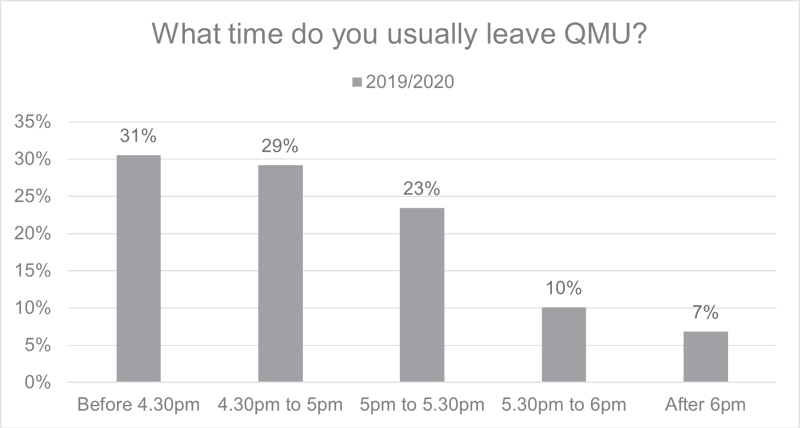
Figure 6.3: Campus Departure Times
This grouping of arrivals was known to cause issues with congestion, over-crowded services and concerns for cyclists travelling in heavy traffic.
Following on from this, several staff and students reported feeling unsafe cycling and walking to campus, 24% and 4% respectively. Issues around designated routes, traffic levels and traffic speed, and lack of lighting were all cited as issues.
When car users were asked what would encourage them to use public transport when travelling to QMU in the 2019/2020 survey, more than half said ‘more convenient routes’, Figure 6.4.
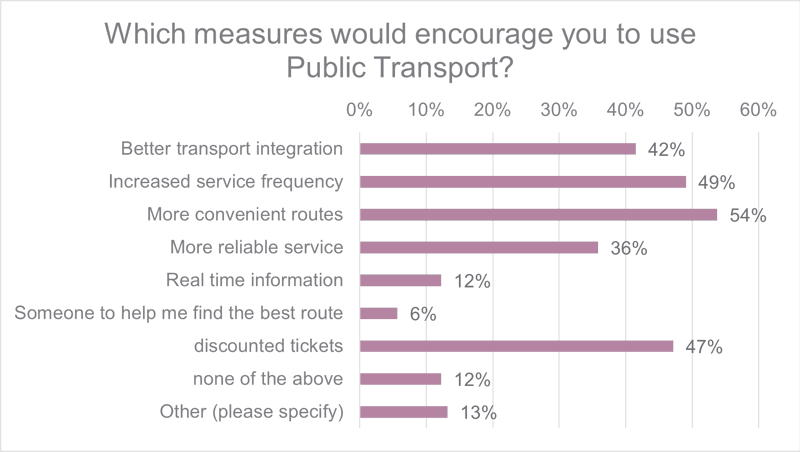
Figure 6.4: Barriers to Active Travel
At present, the main bus services serving QMU are the Lothian 30 and 45 services and the Prentice 111 service. The 45 in particular is a convoluted route running between Napier University and QMU, which encounters issues around low patronage outside of peak times. Train service frequency has also been cited by staff and students as an issue, with just one service per hour stopping at Musselburgh Station. With the train taking just 6minutes from Waverly Train Station, it can be an excellent connection for those living in the city centre or using Waverly Train Station to connect with services from out-with Lothian.
6.4 Bike Rack Court
Bi-monthly bike counts were carried out on the main bike racks in University Square and the student accommodation bike sheds, namely Bike Shed 1 and 4. Bike counts from the beginning and end of each month are then recoded, as shown in Figure 6.5. Regular monitoring was halted in April 2020 due to the Covid-19 pandemic and closure of campus.
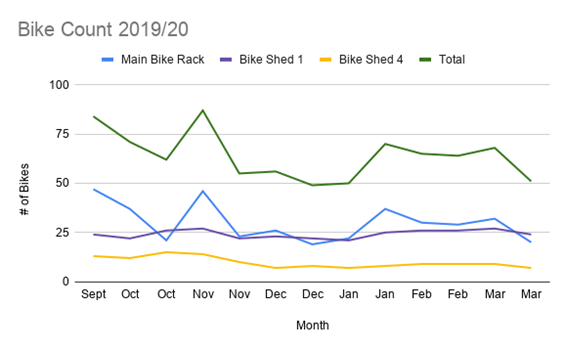
Figure 6.5: Campus Bike Counts
The results show relatively consistent use of the accommodation bike sheds with bike shed 1 being more regularly used. This is likely due to its more prominent position, whereas bike shed 4’s entrance is to the rear of a bin store. Banners similar to that in Figure 6.6 may help increase awareness
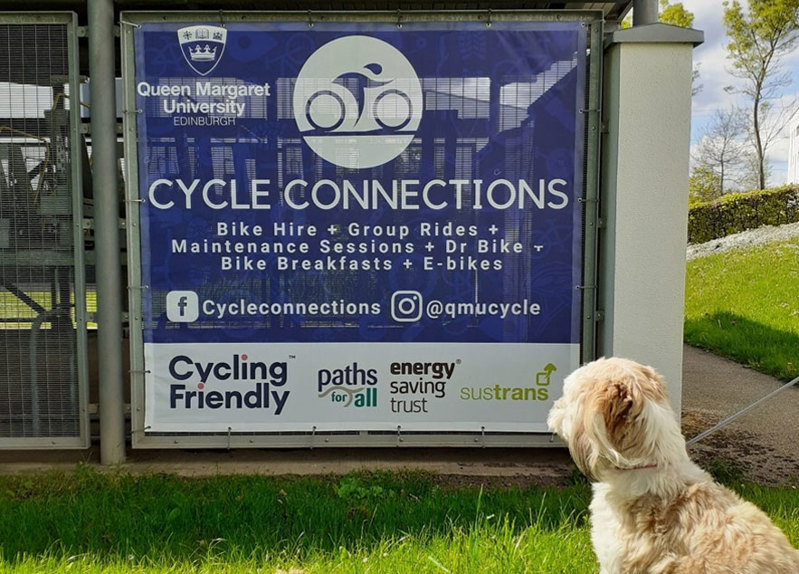
Figure 6.6: Promotional Banner on Campus
Results for the counts of the main bike racks are more varied with a dip observed from late November until early January. This is likely due to the end of student classes by late November/early December and the university closure over the festive break. It is felt that the colder weather is less of a deterrent as rates increased 68% between early January and late January despite the temperature being 2oC lower at the later date.
Since the return to a partial opening of campus bike counts have been reinstated. The numbers observed in Bike Shed 1 and 4 have maintained similar to those prior to lockdown however there has been a sharp reduction in the numbers of bikes on the main bike racks, with an average of 12 bikes, compared to an average on 30 prior to the pandemic. The continuity of bike count levels in the accommodation bike sheds, suggests there may be more abandoned bikes than anticipated, this should be monitored to ensure there is space for active bike users and to ensure abandoned bikes are repurposed before they have corroded.
Abandoned bike numbers are also regularly monitored on the main bike racks and are labelled before being removed for storage. After a period of 3 months in storage, if unclaimed the bikes are donated to the Edinburgh Bike station or Bikes for Refugees. So far more than 30 pedal bikes, 3 children’s bikes and 1 faulty e-bike have been donated.
7.0 Consultation and Engagement
7.1 Aims and Audience
For engagement, the aim was to consult with a large range of different stakeholders across the university, with representation from both staff and students. In addition, it was recognised that QMU can also learn from other institutions and Active Travel organisations.
Inside the University, those with existing interest in active were approached, such as the sustainability committee and cycling groups. As well as these, it was important to hear from those with not directly affiliated with travel, but with still important roles within campus life, such as the ‘Reslife’ team who work with the residential buildings and students.
For external contacts, we engaged with groups with extensive experience in different behavioural change and infrastructure projects centred around Active Travel, such as Cycling Scotland. In addition, we reached out to other academic institutions within Edinburgh to understand projects and incentives that have worked for them and learn from their experiences.
7.2 How we engaged
7.2.1 Annual Travel Survey
Each year QMU conduct a travel survey. This survey follows the same general format, including questions on mode of transport, distance travelled and specific questions on each form of transport. Results from this survey give base data for existing habits, motivations and awareness of schemes on campus. There’s also comment sections throughout for respondents to provide more detailed responses and raise specific barrier and opportunities. This year’s travel survey also included Covid-19 specific questions to understand the impact and possibly influence short term projects for Covid-19 related issues.
The 2020/2021 survey could only be advertised online and therefore received less responses than normal with 220 respondents. Results from the 2019/2020 which are still relevant will also be examined in the analysis.
7.2.2 One-to-one Stakeholder meetings
Key stakeholders at the university were invited for one-to-one meetings. An information sheet on the strategy, including a list of key points for stakeholders to consider was produced and distributed ahead of meetings to ensure stakeholders had had a chance to consider the topic and/or discuss with relevant members of their department. 25 stakeholders were contacted for meetings with 17 accepting the invitation to discuss.
Table 7.1 shows those engaged with:
| Stakeholder | Representing |
|---|---|
| Adam Kesby | Sustrans |
| Alice Kerr | Maggie's/1875 |
| Bruce Laing | Campus & Facilities |
| Chris Green | Outdoor Education |
| Chris Martin | Campus & Facilities |
| Chiara Menozzi | Student Union |
| Iain Reid | East Lothian Council |
| Jane Culpan | Exercise, Rehabilitation & Wellbeing |
| Jill Burnett | EAUC |
| Judith Lane | Physiotherapy |
| Konstantin Bohm | Student Cycle Society |
| Olga Sanchez | East Lothian Council |
| Patrick Boxall | Psychology, Sociology & Education |
| Paul Grice | University Principal |
| Sarah Macdonald | Sport Centre |
| Valentin Jean Jean and Jayne Ann Brown | Cycle Scotland |
| Zara Carmichael | Student Yoga Society |
Table 7.1: Stakeholder List
To ensure consistent results across stakeholder meetings, a survey was prepared as a prompt for the strategy team member. This included comment boxes to allow for the conversations to move onto unexplored topics.
7.2.3 Collaboration With Local Campuses
Through the Cycling Scotland funded internship scheme, good relations and knowledge share were able to be established between the 7 other institutes running the internship, shown in Table 7.2.
| Campus |
|---|
| Napier University |
| Glasgow College |
|
Highlands and Islands Students Association |
| South Lanarkshire College |
| Robert Gordon University |
| Fife College |
| Transition St Andrews |
| Queen Margaret University |
Table 7.2: Campus Cycling Officers
There are also established relations between the transport teams at The University of Edinburgh, Heriot Watt University and Edinburgh College.
A selection of group and one-to-one meetings were held to discuss schemes and facilities at other campuses that promoted sustainable travel and to share knowledge.
7.2.4 Face-to-face Events
Due to the ongoing Covid-19 pandemic the traditional face-to-events have been limited. For instance Bike Breakfasts and Led Rides which would traditionally be an opportunity to hear feedback from staff and students. However, events such as monthly Dr Bike sessions and the freshers fair stall were able to go ahead.
These events were used as an opportunity to add staff and students to the monthly mailer lists, receive verbal feedback and promote the cycling and walking services available.
Once restrictions lift we would advise the reinstatement of Bi-semesterly Bike Breakfasts, with a change of location from 1875 to Maggie's due to outdoor seating availability and proximity to Dr Bike Sessions and Bike Racks. It would also increase the visibility of the event.
A feedback box should also be installed next to the Active Travel Notice Boards in the main building.
7.2.5 Monthly Mailer
A monthly Mailer was set up in 2020, which know has over 120 recipients. It is used to promote campus and local events, Active Travel routes, campus facilities and raise awareness around Active Travel.
7.2.6 Cycle Connections Email
A dedicated Cycle Connections email account was set up in 2020 to improve communications and accessibility for staff and students. It is used as the main contact point on marketing and materials and social media and can be monitored by several members of the team. It also allows for the account to be easily passed on to new members of the team.
8.0 Results & Key Finding
8.1 Overview
The following chapter looks over the key findings from the engagement and consultation process.
8.2 Annual Travel Survey
Figure 8.1 shows the modal share from the past three years travel surveys
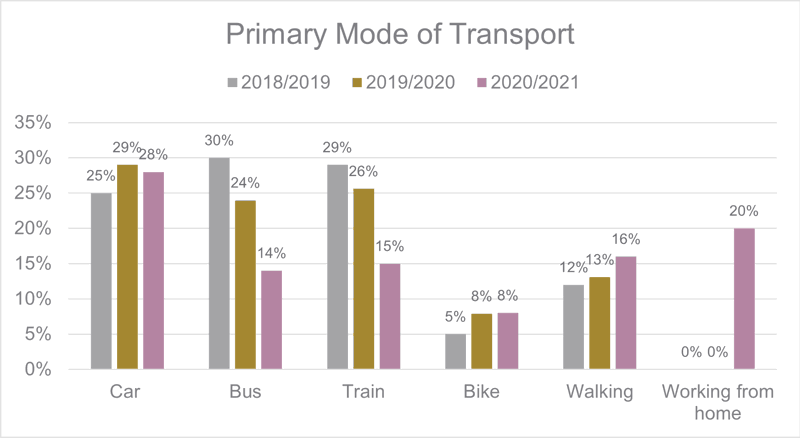
Figure 8.1: Modal Share
The 2020/2021 results show increases in sustainable methods and a decrease in private vehicle journeys, and for the first year includes working from home. However, there were considerable decreases observed in the public transport modal shares.
8.2.1 Increasing Active Travel Rates
When Bus, Train and Car users were asked what would encourage them to choose an active form of travel, 22% stated “Nothing, it is impractical” however improvements to routes such as surface cover, lighting, directness and increased promotion of routes were cited as factors that could make walking, wheeling and cycling to QMU more attractive. The results are shown in Figure 8.2.
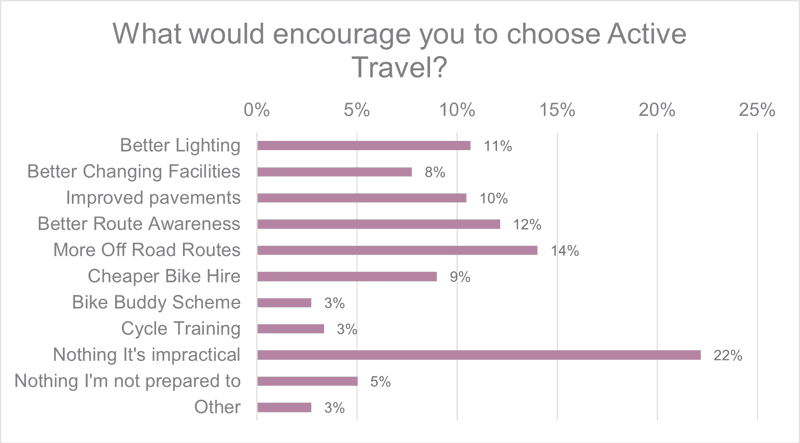
Figure 8.2: Encouragements for Active Travel
Some of these changes can be enacted by the university and others are already underway. For the barriers such as lighting and routes, improvement can be made through collaboration with local councils and transport organisations.
Opportunities for stakeholder consultation or public engagement on new proposals and schemes should be taken up by the university and promoted to staff and students, for example, the Musselburgh Active Toun Route Proposals, Table 8.1highlights further opportunities.
| Group |
|---|
| City of Edinburgh Council |
| Cycle Law |
| Local Developers |
| East Lothian Council |
| Local Schools |
| Lothian Buses |
| Midlothian Council |
| Musselburgh Active Toun |
| Musselburgh Area Partnership |
| Paths for All |
| Prentice Coaches |
| Scotrail |
| Sustrans |
Table 8.1: Engagement opportunities
Figure 8.3 highlights awareness of current schemes running on campus. The lowest awareness levels were the schemes mainly targeting staff, Bike-to-work and e-bike hire.
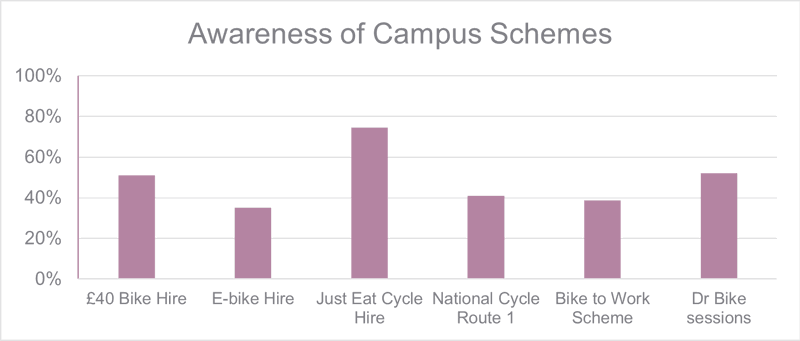
Figure 8.3: Facilities Awareness
8.2.2 Reducing Single Occupancy Car use
Those that primarily commuted by car were asked what would encourage them to use public transport, the results are shown in Figure 8.4.
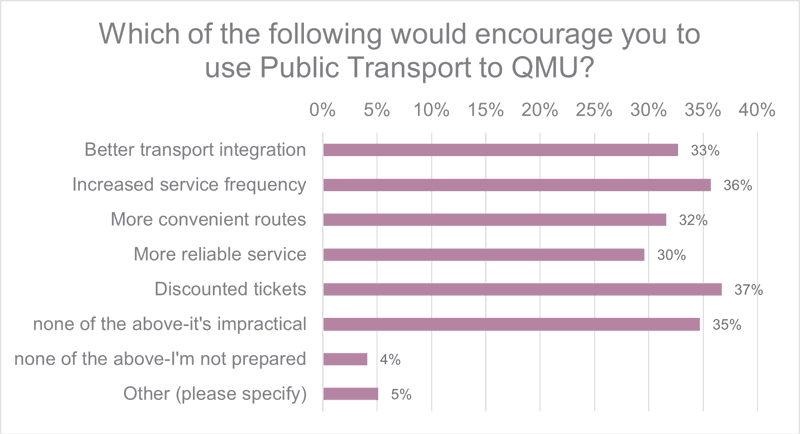
Figure 8.4: Public Transport Encouragements
The cost of bus and rail tickets was highlighted as the main barrier. The university currently subsidises travel on Prentice Coaches for students, however only 1% of bus users used this service. Those that did use Prentice Coaches highlighted issues with student cards being declined. This is due to be followed up on.
Timeliness of public transport services were also cited as a barrier in stakeholder meetings and in the survey. 77% of car users stated they chose to drive as it was the quickest option. Improved bus services along the city periphery and increased frequency of the Musselburgh train were cited as solutions.
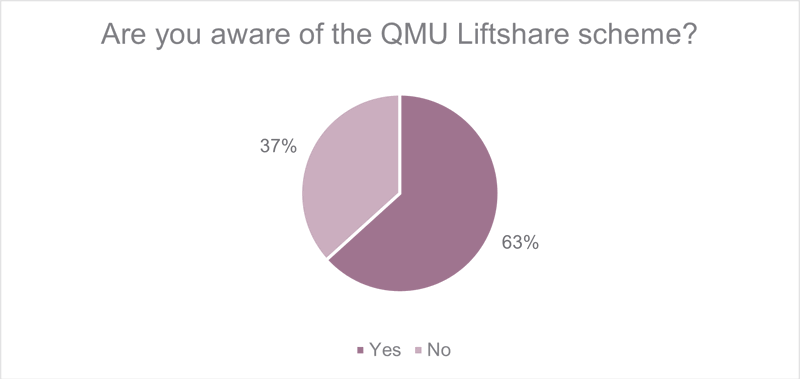 Figure 8.5: Awareness of Liftshare Scheme
Figure 8.5: Awareness of Liftshare Scheme
It is recognised that Active Travel or public transport will not be feasible for all at present and so promoting more sustainable ways of driving such as Liftshare or e-vehicles is crucial. With 37% of respondents unaware of Liftshare, further promotion of the scheme is required, Figure 8.5.
8.3 Commuting Emissions
Table 8.2 shows the number of journeys and associated emissions averaged across the whole university over the course of a week and a year.
| Emissions Category (tCO2e) | 2018/2019 | % Change | 2019/2020 | % Change | 2020/2021 |
|---|---|---|---|---|---|
| Total Commuting Emissions | 1764 | -27% | 1286 | -43% | 731 |
| Total Student Emissions | 1310 | -14% | 1127 | -49% | 576 |
| Total Staff Emissions | 217 | -27% | 158 | -3% | 154 |
| Average Emissions Per year per Student | 0.18 | +44% | 0.38 | -3% | 0.33 |
| Average Emissions Per year per Staff | 0.47 | -28% | 0.34 | -3% | 0.33 |
Table 8.2: Commuting Emissions
The table shows that the average student and the average member of staff (outside of the Covid-19 pandemic) at QMU create 0.18 and 0.47 tonnes of CO2 respectively, per academic year through commuting. The UK average for a person living in a city or large town is 1.4 tonnes of CO2 per year (BEIS, 2020).
Continued reporting of commuting emissions will help create an accurate baseline for emissions rate to improve upon. It will also increase university accountability in enabling sustainable transport choices.
At present there is no accepted Scope 3 emissions relating to commuting methodology and so it is advised that expert advice is sought from a carbon specialist team.
8.4 Key Stakeholder Findings
In order to gauge the experience of stakeholders in terms of transport, each was asked their primary mode of commuting. The results are shown in Figure 8.6.
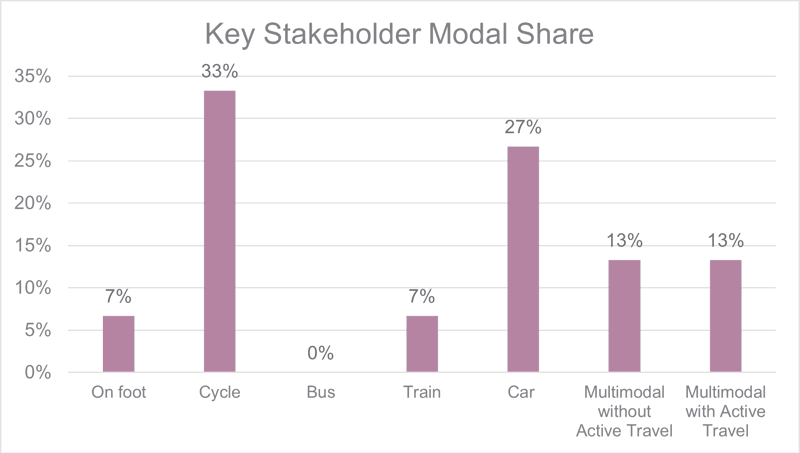
8.4.1 Barriers
When stakeholders were asked what issues they encountered, frequency and convenience of public transport services was regularly cited. It was felt that for those particularly in West Lothian and along the North Coast of Edinburgh, there were no direct options to campus. Cost of train services was a deterrent and several stakeholders mentioned the importance of promoting discounts or creating a bus/train card that would work on both services.
For those travelling actively the main issues were access and awareness of quiet routes and in winter, ice was regularly cited as an issue. Mention was also made to the convenience of the car on days when the weather was bad, drop offs on route were required or energy levels were low.
For those that drove, 1 used an electric car and 1 car shared. Several made mention of the existing slip road out of QMU campus and the poor visibility when joining the City of Edinburgh Bypass.
8.4.2 Missing Links
When asked what routes could be improved or created there was a consensus that cycle routes within Edinburgh City Centre were generally of good quality and connected key locations. However links out-with the city centre, particularly around the periphery and the west of Edinburgh, were seen to be lacking. It was felt that route were set up in a ‘wheel spoke’ layout, with the majority leading from out-with the city to the city centre, making reaching QMU difficult without going into the city centre to join the NCR 1.
Particular roads and links were also raised by several stakeholders:
- Crossings along the City Bypass.
- Bike Gutters over bridges (Brunstane Station).
- Link between Leith/Portobello and Musselburgh.
- Cycle lane/path along Niddrie Mains Road; and
- Edinburgh Rd/Newhailes Rd junction.
8.5 Key Finding for other University Collaboration
Discussions with the campus representatives from colleges and universities across Scotland raised the following barriers and opportunities for increasing sustainable modes of travel on campus.
8.5.1 Barriers
Priority
Perceived priority of Active Travel within campus teams was raised as a barrier to progress and improvements at times. With the multitude of needs within a higher and further education institute, and at times the lack of a permanent member of staff, it was felt that Active Travel issues could be difficult to raise
Gathering evidence on and creating policies for Active Travel was seen to be an effective way of raising its profile within campuses and creating accountability.
Timescale
Particularly amongst interns who were on 34-week contracts, it was felt that there was not sufficient time within one academic year to create lasting change in regards to sustainable travel. There were also issues around timescales to secure and spend funding within the allotted time.
Creating a permanent role for a member of staff to oversee sustainable travel allows for continuity and continuation of schemes. It also creates the possibility of enacting longer term projects that would take longer than 1 academic year.
Infrastructure
Lack of safe cycling and walking routes to campus was seen as a major barrier to encouraging more to walk or cycle. It was felt that the campus could only offer so much support, equipment and training, but is the roads to campus were perceived as dangerous, then cycling in particular would remain the mode share of a minority.
Working with local councils and Active Travel groups was seen as a way to promote the need for improved infrastructure. Cycle and driver training was also mentioned as a way to increase perceived and actual safety.
8.5.2 Opportunities
Bike Hire
Several campuses offered bike hire schemes similar to that at QMU. Transition St Andrews used up-cycled 2nd hand bikes, that were renovated by staff and volunteers for their bike hire. This allowed for training and volunteering opportunities as well as reducing waste and emissions. Robert Gordon Universities Bike Hire scheme is primarily run by student volunteers and the CCO.
Creating greater opportunities for QMU students to get involved in the running of the bike hire scheme and offering them bike mechanic training should be considered. This could work well through the Campus Cycling Champions scheme, whereby students are paid for a couple of hours work a week, helping increase rates of cycling.
Department
The departments responsible for Active Travel and transport varied throughout campuses. Some had dedicated sustainability teams, others were part of the student unions. Some CCO’s felt that being part of the student union was beneficial for reaching students and gaining advice around events and promotion. However, it was felt that it took longer to get sign off on infrastructural measures.
QMUs CCO benefits from being based in the Campus and Facilities department as discussions and decisions around infrastructure can be made however, it would be recommended that the future CCO is able to work closed with the student union and that they have access to a more student accessible place of work. The creation of the sustainability committee on campus is also a great opportunity to discuss and make positive change around travel.
Country Wide Collaboration
Good communication links between universities already exists, QMU has worked with Edinburgh campuses on sharing funding to support city bike hire for students. Ensuring these bonds remain, when interns and staff rotate, is crucial to ensuring long term projects and behaviour change can be achieved
A particular success in regards to collaboration is the Switching Gears Festival that was pitched by Transition St Andrews’ Tamzin Dewar and created by the CCO’s at 7 campuses across Scotland. It was a festival of online webinars around inclusivity and diversity in cycling. With speakers from across the UK and Ireland discussing a range of topics, free to view to staff students and the public. The event was a great success and is hoped to return annually. A link to the talks can be viewed online:
Switching Gears Festival
9 Action Plan
9.1 Overview
The following action plan highlights the short term, medium term and long term projects that should be initiated in order to meet the set objectives:
- OB1: An increased awareness of active and sustainable travel facilities and services on campus;
- OB2: Active and Sustainable Travel to be accessible for all;
- OB3: An improved cycling culture on campus;
- OB4: A more attractive and joined up public transport service; and
- OB5: An increased modal share in active and sustainable travel
9.2 Planned Facilities
There are a number of facilities that were deemed urgent or that had been delayed due to the Covid-19 pandemic due to be introduced to campus by then end of this year, they are as follows:
- Expansion of student bike hire fleet by 10 step-through bikes.
- New padlock system for individual bike sheds.
- Locker wraps to promote Active Travel.
- Adapted bike parking.
- Cycle Spares sold through Maggie's.
- Improved flexibility in parking permits; and
- Reinstatement of bus services to campus-disrupted to the Covid-19 vaccine centre.
All of the above are based off of feedback from stakeholders and from feedback in the Annual Travel Survey. The physical improvements are funded by Cycling Scotland and the universities Green Travel Fund.
The planned improvements will make Active Travel more convenient, enjoyable and secure for staff and students.
Adapted Bike Parking
Inline with recommendations from Wheels for Wellbeing, funding has been secured from Cycling Scotland, to create and install a proto-type adapted bike rack. The stand would allow for easy parking and locking of adapted bikes, particularly those used as a mobility aid. Figure 9.2 is a sketch based of the original design by Kevin Hickman, of Wheels for Wellbeing. The racks are being made by Dunblane Light Engineering. The space will have floor graphics identifying it as an adapted bike space.
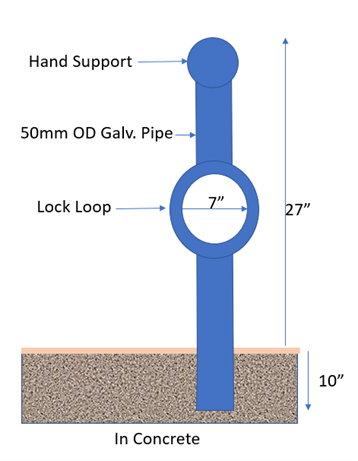
Figure 9.2: Adapted parking
9.3 Future Facilities
To further improve provisions on campus and increase the uptake of sustainable modes of travel the following is proposed:
- Improvements to changing facilities.
- Increased cap on bike-to-work scheme.
- Clothes drying facilities; and
- On Campus Shop.
Changing Facilities
It is proposed that the existing changing facilities in the main building become student and visitor only and a new changing facility for staff members is created on the ground floor of the main building, to make use of a currently underused changing facility. The changing rooms will also include communal drying facilities for equipment to encourage cycling and walking to continue through the winter.
Bike To Work Scheme
The current cap on Bike-to-work of £1000 should be upped to £3000 to allow for the purchase of e-bikes. Promotion of the governments zero interest loans through the Energy Saving Trust, for e-bikes, should also be promoted to those who state an interest.
Campus Shop
The university already has an on campus shop for essentials such as toiletries, snacks and drinks. However, in order to reduce the need to travel to town for provisions there discussions around creating a shop to provide a wider and more affordable scope of supplies. Over the Covid-19 lockdown, Maggies introduced a supply of goods and donated surplus food for students on campus and the student union set up ‘The Pantry’, a pop-up-shop providing free goods for anyone who had paid the £1 weekly membership. Creating these on campus services helps create a ’20-minute Neighbourhood’ within the campus.
20-minute Neighbourhoods provide key services to residents, all within a 10-minute walk, creating a 20-minute round trip. They increase activity levels and reduce inequality in terms of access to services, education, employment, and medical services. Figure 9.3 shows the 17 criteria of a 20-minute Neighbourhood and highlights those that QMU meets and those that require attention.
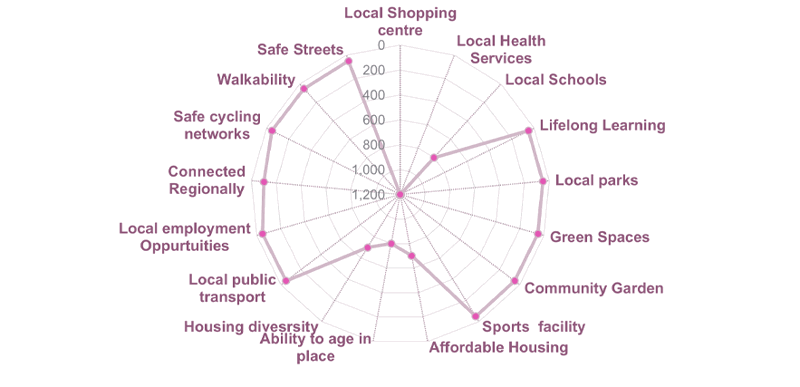
Figure 9.3: QMU as a 20minute Neighbourhood
9.3.1 Promoting Sustainable Car Journey
The university also understands that for some, using a private vehicle will remain their sole option, and so facilities will be put in place to encourage those journeys to be as environmentally conscious as is feasible. This will be achieved by:
- Increased EV-charging Stations.
- Promotion of QMU Liftshare Scheme.
- Flexible Parking Permits; and
- Promotion of campus car club.
EV Charging
At present, the campus hosts 4 Chargeplace Scotland EV-charging stations in the main carpark and a further 2 in the staff grounds car park. BREEAM criteria states that 3% of car parking spaces should be electric charging station. For the QMU car park this would equate to 12 charging spaces. Discussions are also underway on the possibility of introducing monetary charges for the use of the charge points, this could be reinvested into sustainable initiatives on campus.
Parking Permits
Feedback during the consultation process highlighted that staff and students felt restricted by the parking permit system. In particular they felt that if you were required to drive a one or two days per week, the cost of day passes compared to semesterly/yearly permits, encouraged you to drive every day as there was a feeling you paid for those days. By increasing the flexibility of the permits there will be less of a feeling of all or nothing, and on days when staff or students don’t need to drive, they will be encouraged to travel actively or by public transport.
Car Clubs
The university hosts 2 Enterprise car Club vehicles, an electric and a petrol. Staff and students can hire a car for £4.50/£5.50 per hour and can access free annual membership using the universities promotional code. Increasing visibility of this scheme and promoting it within departments, can reduce individuals dependency on a personal vehicle.
9.4 Planned Services
There are several services currently under review, awaiting confirmation or due to be initiated. They are as follows:
- Bike maintenance sessions for staff.
- Outdoor Activity Hub.
- Prescribed Active Travel Scheme.
- Bike Spares available from Maggie's;
- Trial EV Charging Support.
Outdoor Learning Hub
Led by the Primary Education department, funding has been secured for an outdoor learning hub. The facility will be based on campus and create a space for outdoor learning and activities. Discussions with the Education Department have suggested that the hub can evolve to include Active Travel activities for the campus community as well as the public.
Prescribing Active Travel
Working alongside the universities Physiotherapy department, a trial ‘Prescribing Active Travel’ scheme should be arranged. The scheme would link physiotherapy patients who would benefit from increased levels of physical activity with a cycle skills training session, run by a qualified instructor, on campus. The scheme would make use of the universities hire bikes and provide the patients with the skills and confidence to cycle more often.
Maggie Bike Stop
In order to increase connections with the surrounding community and enhance the culture of cycling on campus, the Active Travel Team have been in discussions with Baxter Storey, who manage the student union bar, Maggie's. Maggie's will be supplied with bike spares at a wholesale price. This will help promote Maggie's as a cyclists friendly café and bring visitors and locals onto campus
9.5 Future Service
Based on existing and planned services for campus, a list has been compiled of future services which should be considered:
- Issue reporting service.
- Flexible start/end times.
- Increased information and promotion of facilities/routes etc.
- Partnership working with Public Transport organisations.
- Campus Community Beach/Route Cleans; and
- Closer collaboration with Sports Centre.
Issue Reporting Service
Several barriers to Active Travel, raised during the annual travel survey and the stakeholder consultation, were out-with the campus and the universities control, Table 9.1. However, the introduction of an online issue reporting service could consolidate issues, making lobbying local council or developers more streamlined. It could also help raise awareness of any issues such as ice on cycle routes, which could then be promoted via social media channels to the QMU community.
| Barrier | Responsibility of | Solution |
|---|---|---|
| Icy Active Travel Routes | Council/developer | Gritting Policy |
| Brunstane Bridge | Network Rail | Bike Gutter |
| Craigmillar | City of Edinburgh Council | Segregated route |
| City Centric Approach | Councils/Employers/Developers | Secure, sheltered parking at key interchanges |
| Path Maintenance | Councils | Route Quality Audits & vegetation maintenance |
| Train Timetables | Scotrail | Increased services stopping at Musselburgh |
| Close passes | British Transport Police | Education and enforcement |
| Wayfinding | Councils | Signposting and maps |
| Rural Roads | Councils | Segregated routes and speed management |
Table 9.1: Barriers to Active Travel Off Campus
Staggered Start/End Times
Stakeholders and travel survey participants cited that peak-time travel was a deterrent to both Active Travel and public transport. Issues were around concerns of safety on roads with heavy traffic, increased fare prices at peak times and overcrowding. In response to the Covid-19 pandemic the university extended its class times to reduce the number of people on campus at a time. Maintaining this arrangement could help encourage sustainable modes of travel for both staff and students, however further consultation would be required.
Promotion
Lack of awareness of routes, services and facilities was also raised as a barrier to uptake. At present the university promotes sustainable travel options through the universities website, campus media, mailers and the universities cycle scheme-Cycle Connections. It is clear however, from stakeholder and travel survey feedback and from general uptake, that further promotion is needed. Table 9.2 highlights suggested measures to increase awareness.
| Method | Description |
|---|---|
| Welcome Pack |
For new staff and students a section on sustainable travel options and campus facilities will be included |
| Reslife Promotion |
Materials will be shared with the Reslife team to share with students in halls |
| Campus Signage |
Shared use signage as well as promotional banners will create an Active Travel environment on campus |
| Visible events |
Active Travel events will be held in prominent positions where possible e.g. Bike Breakfasts moved from 1875 to Maggie's |
| Course Integration |
Introducing sustainable travel segments into courses with invited speakers |
| University Branding Integration |
Work with the university to include images of Active Travel in the universities overall branding and promotional materials |
| Cycle Connections Re-brand |
A rebrand of the cycle connections logo and increased use of new logo on all materials and improve consistency in design |
| Clearer Communication Routes |
The university previously promoted social media for queries regarding Active Travel, however a designated email address has been created to ease communication and increase accessibility |
Table 9.2: Increasing Awareness
Improved Public Transport Service
The university has long had communication channels established with local public transport providers. It is critical to maintain these channels, especially in recovery from the Covid-19 pandemic and the ambitions to increase public transport uptake. As demand increases for public transport, particularly at peak teams, pressure should be placed on Lothian buses to increase provisions. The university should also consider a departures board television screen in key spaces such as Maggie's, 1875 and the main foyer.
Beach Cleans
Working alongside Musselburgh community group-Love Musselburgh and Sustrans, the university should host and promote beach and cycle route litter picks as part of community relations, sustainability and a method of promoting Active Travel. For Litter picks held off campus, there should be provisions made to hire bikes or travel by bus/train as a group.
Collaboration with Sport Centre
The sustainable travel team have worked alongside the universities sports department in the past to host cycling and running events. These collaborations should be continued while also expanding to promote sustainable modes of travel to university staff and students using the gym and sports centre facilities, as well as members of the public. Sustainable travel methods and campus facilities should be promoted to all new joiners and regularly promoted on the sports centre social media.
9.6 Action Plan Table
9.6.1 Short Term
| Project | Overview | Benefit | Time/Frequency | Target | Collaboration |
|---|---|---|---|---|---|
| Face-to-face Events | Bike Breakfasts | Create a community of walking and cycling | Semesterly | Support for those new to QMU or Active Travel | Baxter Storey |
| Led Rides | Promote local routes | Bi-semesterly | Route Awareness Increases | Student Union | |
| Wellness Walks | Social inclusion and mental wellbeing |
Weekly/monthly |
Run Regularly by students | Wellbeing Advisors | |
| Lunchtime Stalls | Promote facilities and services and gather feedback |
Bi-semesterly |
Increased awareness of facilities | Student Union | |
|
Beach/Route Cleans |
Create community connections and promote local routes |
Semesterly |
Create recurring initiative | Sustainability Soc and Love Mussel-burgh | |
| Bike Hire Fleet |
Expand Fleet |
Increased access to bikes |
Sept 2021 |
Bikes available to meet demand | Cycling Scotland |
|
Increase Promotion |
Higher Uptake |
Ongoing |
70% of respondents are aware in survey | University Wide | |
|
Streamline Hire |
Make hire easier to arrange and track |
Dec 2021 |
90% of bikes are hired each semester | Security Team | |
|
Maintenance |
Regular and recorded maintenance of hire bikes |
Sept 2021 |
Bikes are M-checked before hire and full service semesterly | Edinburgh Bike Doctors | |
| Bike Maintenance |
Dr Bike Sessions |
To keep bikes road-worthy |
Monthly |
10 bikes serviced/month | Edinburgh Bike Doctors |
|
Maintenance Training |
Increase independence and safety |
Semesterly |
10staff/students access training per semester | Edinburgh Bike Doctors | |
|
Tool Kit Promotion |
Increase independence and safety |
Ongoing |
Signed out regularly from security | Security | |
| Active Routes |
Mapping local routes |
Maps available online and on campus |
Sept 2021 |
Up to date and local routes | Sustrans |
|
Route Films |
Video footage of local routes |
Dec 2021 |
6 local routes filmed | Napier University | |
|
Promote new NCN1 Sections |
Increase usage |
Ongoing |
Awareness in survey is 70% | Sustrans | |
|
Place Making |
Raise Awareness through shared use signs on campus |
Sept 2021 |
Reduced conflict and increase awareness of access to NCR 1 | Apex Signs & Cycling Scotland | |
| Facilities |
Adapted Bike Parking |
2 adapted bike racks installed |
Sept 2021 |
Promoted locally | Wheels for Wellbeing |
|
Changing Rooms |
More storage and seating provided |
May 2022 |
Increased approval rating in annual survey | Campus and Facilities | |
|
Lockers |
Improve booking system and introduce key deposit |
Jan 2022 |
Receive key within 5 days of initial email | Security | |
|
Campus Shop |
Reduce need for journeys |
|
Reduction in number of car journeys to Tesco/Asda | Baxter Storey | |
| Support |
Bike to Work Scheme |
Increase Cap to £3000 |
May 2022 |
Uptake increases | HR Team |
|
Placement Bike Hire |
Students on placement access e-bike hire |
Jan 2022 |
4 students access e-bike hire | Health Courses | |
| Communication |
Inclusive Language/imagery |
Through the avoidance of terms such as ‘Driver’ and ‘Cyclist’ we can make it less divisive and humanizing |
Ongoing |
Staff and students feel incorporated and represented in communications | |
|
Clear routes |
Dedicated email account for Active Travel is widely publicized and used in marketing |
Ongoing |
Less requests sent through assist for Active Travel related queries | ||
|
Consistent Messaging |
Marketing and advice/information is consistent and clear |
Ongoing |
Cycle Connections branding is recognized as the Active Travel scheme at QMU | QMU Marketing Team | |
| Public Transport |
Pressure for reliable service |
Avoid missed stops or full services |
Sept 2021 |
Improved rating of service in annual survey | Lothian Buses & Prentice Coaches |
|
Promote under 22’s free travel |
Increase the rate of young people using buses instead of single occupancy car journeys |
2022 |
Reduced car related emissions and increased financial accessibility | Lothian Buses | |
|
Promote affordable travel options |
New staff and students are aware of discounts/subsidies and alternatives |
Ongoing |
Awareness of university subsidies and public transport discounts increases | Lothian Buses, Just Eat Cycles, Scotrail, Prentice Coaches | |
| Car Use |
Flexible parking pass |
Encourage those that drive some days to choose sustainable methods when possible |
Sept 2022 |
Decreased car park occupancy | Campus & Facilities |
|
EV charging |
Increase provisions and explore payment for electricity |
Rates of EV ownership by staff and students increase |
2022 | Charge place Scotland | |
| Staff |
Campus Cycling Officer |
To motivate and enable staff and students to travel actively |
Awareness and uptake of schemes increases |
Aug 2021 | Cycling Scotland |
|
Research Work Experience |
Recruit a graduate for work experience around research in Active Travel |
Support new starts in the industry and collect valuable data |
Aug 2021 | Green travel Fund |
9.6.2 Medium Team
| Project | Overview | Benefit | Timeline | Cross Over |
|---|---|---|---|---|
| Community Projects | Bike Café | Create an environment welcoming to walkers and cyclers at Maggie's. With kit and repairs available | Sept 2022 | Baxter Storey |
| Prescribing AT | Work with the Physio team on supporting patients in building confidence on a bike as a form or rehab. | Sept 2022 | Physiotherapy Department | |
| Community Benches | Benches in the community along Active Travel routes, decorated by local schools | Jan 2023 | Sustrans Artroots Fund | |
| Bike Hire Fleet | Adapted Bikes | Allow staff and students access cycles that are adapted to their needs | 2022 | Wheels for Wellbeing |
| Balance Bikes | Working with the outdoor hub to create a community spot for learning to cycle | 2023 |
Outdoor Activity Centre/Cycling Scotland |
|
| Replacement Bikes | Explore the renewal of original bike fleet and re-evaluate scheme | 2023 |
Cycling Scotland |
|
| Lobbying | Community Input | Create a way for staff student and locals to report issues around Active Travel | 2022-2024 |
IT department |
| Route Gritting | Lobby council and developers to create a programme for Active Travel routes | 2022-Ongoing |
East Lothian & City of Edinburgh Council |
|
| Accessible Routes | Lobby councils to ensure set standards for cycle and walking routes | 2022-onwards |
National Rail & Councils |
|
| Staffing | Active Travel Champions | Recruit student members to be paid part time ambassadors for Active Travel | 2022-onwards |
|
| Internships | Secure longer term funding for a permanent internship scheme |
2022-onwards |
Cycle Scotland |
|
|
Accessibility |
Adapted Bike Hire | Create a community hire scheme for adapted bikes available on campus |
2022 |
Wheels for Wellbeing |
|
Mode Share |
Car Sharing | Reduced single occupancy journeys by those unable to use active or public means |
2022 |
Liftshare |
|
|
Bike Buses | Ability to create multimodal journeys |
2023 |
Lothian Buses and Prentice Coaches |
|
|
Demand Responsive Transport | Increased offering in rural or low patronage areas |
2023 |
East Lothian Council |
9.6.3 Long Term
| Project | Overview | Benefit | Timeline | Cross Over |
|---|---|---|---|---|
| Staffing | Permanent Staff | Ability to access more funding and run longer term projects | 2023/2024 | Human Resources |
| Cycling Champions | Permanent scheme offering 5xstudents a year work experience | 2023 | Human Resources | |
| Internship | Continuation of current scheme | 2023 | Cycling Scotland | |
| Facilities | Campus Cycle Route | Marked cycle route and practice spaces on campus | 2025 | Cycling UK, Campus Facilities |
| Changing Rooms | Create larger space for changing | 2025 | ||
| Bike Hub | Space for knowledge and skill sharing | 2025 | Outdoor Education Hub | |
| Drying Room | Encourage winter cycling | 2024 | Campus Facilities | |
| Support | Student Bike Discounts | Subsidised scheme to support purchase-explore buy back scheme | 2024 | |
| Active Travel Incentives | Discount in local shops for Active Travel equipment | 2024 | Musselburgh Area Partnership | |
| Permanent scheme available to staff and students on campus | 2022-onwards | Sustrans | ||
| Learn to ride courses | Permanent scheme available to staff and students on campus | 2022-onwards | Sustrans | |
| Childcare provision | Discount or on site provisions | 2025 | Human Resources and Campus Facilities | |
| Mode Share | Increased Rates of AT | 35% of journeys are walking or cycling | 2025/2026 | |
|
Reduced Single Occupancy Car Journeys |
20% of journeys made by car | 2025/2026 | ||
|
Timetable Flexibility |
Flexibility with start times and working from home for staff and students | Ongoing | Student Services and Human Resources | |
| Sustainable Transport |
Increased Public bus services |
Connecting campus to shops in High street | 2025 | Lothian Buses and East Lothian Council |
|
Subsidised bus fare for students |
Enables sustainable travel to be accessible | Ongoing | Paths for All |
10 Monitor and evaluation
10.1 Overview
Although the strategy outlines the plans for the next 5years, it is an evolving document and so requires annual reviews and continual monitoring to ensure that objectives are reflective of the needs of the university community and that objectives are being met.
10.2 Responsible Persons
The overall monitoring and evaluation for transport at QMU will fall to the Transport Coordinator, a member of the Sweco Transport Team, seconded to the university. A cycling campus officer, funded by Cycling Scotland, will also take part in monitoring during their internship. There are also data sets that are collected by third parties, such as Just Eat Cycles.
10.3 Timeline
Table 10.1 highlights the key sources of monitoring data and the frequency of their collection. Consistency in data type and collection method is key to making reliable yearly comparisons. Allowances are made for future additions to data collection sources.
| Monitoring | Frequency | Responsibility | Reported |
|---|---|---|---|
| Travel Surveys | Annually | Transport Coordinator | QMU Website |
| Bike Counts | Bi-monthly | CCO Intern | Transport Strategy |
| Dr Bike Attendees | Monthly | Edinburgh Bike Doctors | In-house |
| Parking Permit Analysis | Semesterly | Facilities Team |
In-house |
| Scope 3 Emissions | Annually | Transport Coordinator |
Scope 3 Report |
| Liftshare Uptake | Semesterly | Liftshare |
In-house |
| Enterprise Car Club Uptake | Semesterly | Enterprise |
In-house |
| Business Travel | Annually | HR Team |
Scope 3 Report |
| Bike Hire Uptake | Annually | CCO Intern |
In-house |
| E-bike mileage | Annually | CCO Intern |
In-house/Energy Saving Trust |
| Prentice Coaches Uptake | Annually | Prentice Coaches |
In-house |
| Just Eat Cycle Trips (from campus) | Annually | Just Eat Cycles |
Just eat Cycles |
Table 10.1: Monitoring Routes
10.4 Targets
The following quantitative targets will allow for consistent and reliable comparisons to be made and for the success of measures and the campuses overall shift away from single occupancy car journeys to be determined. Current levels are based on results from the 2019/2020 survey due to the skewed results in the 2020/2021 survey as a result of the Covid-19 pandemic.
| Target |
Current (2019/2020 results) |
Anticipated (2025/2026) |
|---|---|---|
| Active Travel Mode Share | 21% | 35% |
| Public Transport Mode Share | 50% | 45% |
| Single Occupancy Mode Share | 29% | 20% |
| % feel safe when cycling | 76% | 90% |
|
Hire E-Bikes Annual Mileage(4 bikes) |
175 Miles | 480Miles |
| Work Experience in Sustainable Travel | 1 Internship per year | Permanent staff member, Internship and 5x student travel champions. |
|
Business Travel Mileage (booked through Key Travel) |
31,871 miles | 10% reduction |
| EV ownership levels | Unknown | 20% of car journeys |
Table 10.2: Target Levels
Anticipated levels shown in Table 10.2 represent the planned shift to more sustainable modes of travel and reduced need to travel due to improvements in remote collaboration, brought forward by the Covid-19 pandemic. It is anticipated that the increasing provisions on campus and improvements made throughout East Lothian and City of Edinburgh in Active Travel routes will lead to an increase in walking and cycling and a decrease in car journeys. The increase in provisions in EV charging on campus and the cessation of petrol vehicles by the Scottish Government by 2030 are anticipated to support the increase in EV ownership
11 Summary and Conclusion
Queen Margaret University has made clear that sustainable travel and transport is a key priority. Benefitting its community of staff and students as well as the local environment. Through confidence, evidence-based practice and creativity, the university has been able to foster an environment of walking, wheeling and cycling.
For the future of travel and transport at the university, work will be targeted to increasing awareness, streamlining processes and ensuring the longevity of projects through internal and external funding allocations.
QMU has taken great steps in their reporting of emissions relating to transport, and work is underway to fine tune processes and methodology, with support from industry specialists.
Initiatives to increase the accessibility of Active Travel and the campus is a great step. Collaboration with university degrees and community groups will be the natural next step.
Through continuing support for the importance of sustainable travel, the university can continue to set a precedent and create a healthy, happy and principled environment.
The information contained in this report allows us to make the following conclusions:
- Levels of Active Travel by staff and students will increase due to furthered support, facilities and improved local routes.
- Public Transport Patronage will increase, particularly from pandemic rates, as a result of increased promotion and subsidized tickets by the university and Scottish Government.
- Further promotion and support is required to increase rates of car sharing and EV ownership.
- Through supporting roles in sustainable travel for staff and students, the university will further advance and show it’s dedication to reducing Scope 3 emissions.
- Improved methods of recording and data collection will be implemented to create a more encompassing and accurate data set for travel and emissions; and
- The university will work with staff, students and local groups to increase accessibility and inclusion at the university, in terms of Active Travel.



